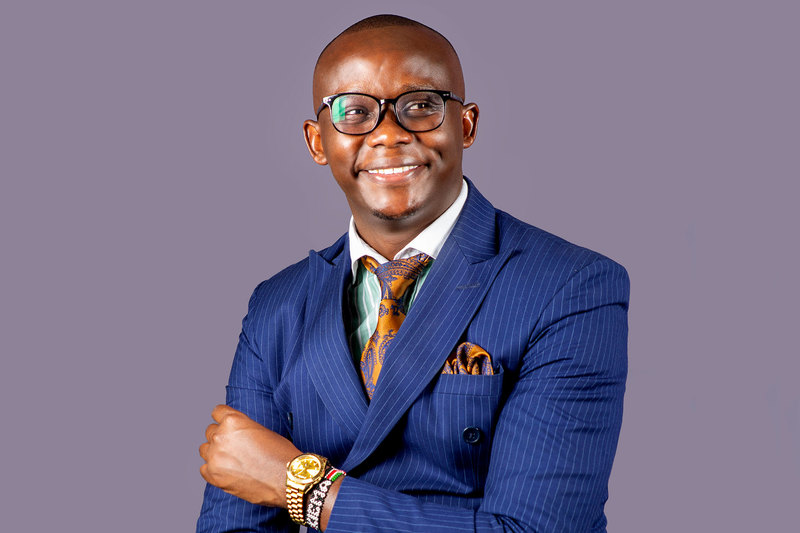Kenyan lawyer gets PhD in Air Law
29 August 2024 | Story Gaby Ritchie. Photo Supplied. Read time 6 min.
Despite being a major breakthrough in the transport industry, the aviation field has often attracted more investors than it has attracted African scholars – especially from the legal field. Few have tried to defy this common trend and even fewer have actually planted their feet, taken a brace and seen it through. William Kiema is one such scholar.
William is a 30-year-old Kenyan who is set to graduate with a PhD in Air Law from the Faculty of Law on 3 September. He is poised to be the second PhD graduate to come out of the newly established Air and Aviation Law Programme led by Distinguished Professor Philippe Salazar, who also happens to have supervised William in his thesis titled, “Open Skies for Africa, A Principled Approach to the Implementation of the Single African Air Transport Market”.
Prior to pursuing a PhD in Aviation Law, William had already started curving his niche in academia. He undertook his undergraduate studies in Bachelor of Laws at the University of Nairobi and graduated in 2018. In a bid to further his education in the field of law, William sought to pursue a Master of Laws degree at UCT. With a desire to not only benefit from the wealth of knowledge that UCT has to offer but also to interact with people from different milieu, he applied for and was successful in becoming a beneficiary of the MasterCard Foundation Scholarship Program, a merit-based scholarship granted to promising African scholars
An unquenchable thirst for research
William’s unquenchable thirst for research and the creation of a stable and properly regulated African airspace led him to notice several gaps within the African civil aviation industry. As a legal scholar, he sought to better understand the aviation industry from a legal perspective – and what better place would provide him the knowledge he yearned for and the opportunity to fuel the academic fire than the UCT? In January 2021, William got admitted to the Faculty of Law to pursue his PhD.
In some sort of retrospect, William remembers that growing up in his hometown in Kenya, he would see planes fly over his head as he stood in awe, wondering what sort of “magic” kept the big birds from falling from the sky. However, like any other child with a vibrant and curious mind, his professional preferences oscillated from being a medical doctor, a lawyer, a pilot and an engineer.
“I became a doctor, not a medical doctor but a Doctor of Philosophy in Law, guiding pilots and other aviators in legal intricacies in arguably one of the most regulated industries in the world.”
“Well, I became a doctor, not a medical doctor but a Doctor of Philosophy in Law, guiding pilots and other aviators in legal intricacies in arguably one of the most regulated industries in the world,” he said. Looking at it in totality, William became an ‘engineer’ too, more specifically a social engineer with his set of skills being employed when Kenyans and other Africans grapple with social justice issues.
Armed with both the desire to further research and the dissemination of knowledge within the field of Aviation Law, and the interest gained from the programme, William pioneered the Fundamentals of Aviation Law Course, which has attracted aviation law practitioners and non-lawyers such as senior executives and managers drawn from the aviation industry such as civil aviation authorities, airports, air navigation service providers, airlines, international and regional aviation bodies, government officials responsible for civil aviation and the general consumers of aviation services.
Chief among the course’s objectives is to provide an overview of the basic fundamentals of international aviation law with a particular focus on air service agreements, open skies agreements, traffic rights, the legal and institutional framework of international aviation and the roles and functions of principal organisations involved in the regulation of the aviation industry.
Expert teaching
William is an occasional guest lecturer at UCT, where he has occasionally been invited as an expert to teach on the law and policy of air transport in Africa. He has also offered a similar lecturer at Harvard Law School. Further, he has written a number of journal articles on aviation law and other limbs of law and is currently working on publishing a number of books interrogating aviation law from a domestic, regional, continental and global perspective. One of his main goals is to provide the bridge between aviation law in Africa and aviation law in the rest of the world – not only as a scholar but also as a legal practitioner.
Besides the foregoing, William has also consulted for leading law firms in Kenya on aviation law related matters and has trained civil aviation representatives from Kenya and Nigeria on aviation and air law. Noteworthy is that he is also a partner at PMAK Africa Law, a boutique law firm in Nairobi, that offers legal services with Africa in mind.
Well, as it is said, too much work without play makes Jack a dull boy: William creates time to sharpen his vocal skills as a choir member and Sunday School teacher at his local church. He is also an artist who likes visiting new places and immortalising moments through the camera lens.
 This work is licensed under a Creative Commons Attribution-NoDerivatives 4.0 International License.
This work is licensed under a Creative Commons Attribution-NoDerivatives 4.0 International License.
Please view the republishing articles page for more information.
Research & innovation





































